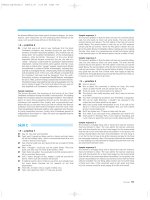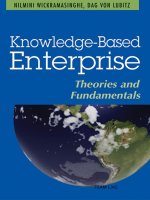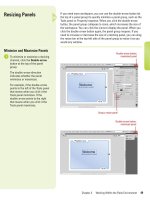Tài liệu A resource for reading and words part 7 pptx
Bạn đang xem bản rút gọn của tài liệu. Xem và tải ngay bản đầy đủ của tài liệu tại đây (221.26 KB, 15 trang )
PASSAGE 46
MEDICAL CARE
Medical care has changed greatly since the days when the
family doctor treated all family members for every type of
medical problem. Today's physician is usually a specialist
who treats only problems with his or her specialty. Today's
specialists often work together in a large group in order to
share costs. The group will buy expensive equipment for its
own offices rather than use hospital facilities. The physician's
office usually has a laboratory where a variety of medical
tests can be done. So, unlike the family doctor, who often
visited patients at home, today's doctors normally see patients
in their office, where they can use specialized equipment.
VOCABULARY
To treat: to care for, to try to make a patient well again
Specialist: a person who has a particular skill or knows a lot
about a particular subject.
Specialty: a particular type of work a person does best
Equipment: things used for particular purpose
Facility: pieces of equipment or services provided for a
particular purpose
A variety of: a number of
Unlike: different from, contrasting
To specialize: to become a specialist
EXERCISES
Complete the sentences with a suitable form of the words
defined above.
1. Some cases of infertility are easy to ., , although others
require complex treatment.
2. He in collecting the work of four artists he considered
fco be the true Cubists, Picasso, Braque, Leger and Gris.
3.
They will want to know that you have a safe, warm place
for children to play, and that your kitchen and toilet are
adequate.
4.
People are still injecting and sharing dirty
5.
In London we have a team of 4 nurses backed up by 2
doctors.
REDING COMREHENSION
1.
The difference between the family doctor of the past and
today's physician is that
A)
family doctors charge higher fees.
B)
the latter does not treat every type of medical problems.
C). both are not specialized in a branch.
D)
physicians can't carry out tests.
E)
family doctors see the patients of their family.
2.
We can infer from the passage that the family doctor
A)
does not need expensive equipment today.
B)
is rich enough, so he need not share costs.
C)
avail himself of the hospital facilities
D)
only treats those who have a family today. -
E)
worked on his own.
3. It is clear in the passage that today's doctor
A)
is not satisfied with the opportunities he has.
B)
sometimes visits patients at home.
C)
has problems with his or her specialty.
D)
is better equipped than the family doctor.
E)
must have a laboratory where he can do tests.
PASSAGE 47
WRITING VS.TELEPHONING
Most people would rather call than write because it takes less
time. They place a great deal of emphasis on accomplishing
things as quickly and efficiently as possible. So it is not
startling that we would place a ten minute phone call to let a
loved one know what is going on in our lives rather than
spend an hour explaining details in a three page letter. In
addition, telephoning is more convenient because there is less
work involved. When using the phone, we merely dial and
begin to talk. When writing a letter, however, we must find
stationery, write the letter, address it, get a stamp on it, mail
it, and then wait, who knows how long for reply.
VOCABULARY
r DEFINITIONS
Emphasis: Special or extra importance given to an activity
To accomplish: To succeed in doing something
Startling: Surprising and frightening
Convenient: Easy, useful or suitable
To involve: To require, to mean
Merely: Only
Stationery: Paper, envelopes, and other materials for writing
EXERCISES
Complete the sentences with a suitable form of the words
defined above.
1. In the business of acting the is always on practical
work.
2. The passage included a bit about small men being unable
great things.
3. Jean had never paid much attention to her appearance
because she didn't have time for it, but now she didn't
have Steven to look after, she used the hairdo as a starting
point for a general overhaul of her wardrobe, and the
effect was quite
4. Using a mouse is very — but some might prefer the
keyboard.
5. This would staying behind after office hours to empty
some bins and hoover around a hit.
READING COMPREHENSION
1 . M o st p e o p l e t h i n k t h a t g e t t i n g i n t o u c h w i t h a p e r s o n b y
writing
A)
is quicker and more efficient.
B)
does not take much time.
C)
is not as efficient as by phoning.
D)
requires less work.
E)
always takes an hour to explain details.
2,
Writing a letter is considered to be
A)
tiring
B)
convenient
C} efficient
D)
emph asizing
E)
quicker
3. If you are an impatient person
A)
writing a letter is n ot meant for you,
B)
yo u shoul d wrrie a letter in stead of phoning .
C)
you can wai t fo r re ply for a lon g time .
D)
explaining things in detail is for you.
E)
ton-minute phone calls are not enough for you.
PASSAGE 48
LITERATURE
The study of humanities has always been prevented by its
abstract terminology. Literature as distinct from the fine arts,
deals exclusively with words. Lacking the visual aspect of
painting and the audio aspect of music, it remains an
ambiguous entity that is constantly being redefined.
Definitions of literature often reflect two extreme positions.
There are those who see literature as a form of art, as a way of
translating experience, and others who see it as a social
document.
VOCABULARY
r DEFINITIONS
To prevent: To stop
Abstract: Way of thinking based on general ideas rather than
on real things and events
Distinct: Separate
Exclusively: Involving only the things mentioned, solely
Aspect: Feature
Ambiguous: Unclear or-confusing
Entity: Thing, unit, being
Constantly: Always, continuously
To (re)define: To describe, to name (again)
Reflect: Show, display.
Extreme: Very great in degree or intensity
r EXERCISE
Complete the sentences with a suitable form of the words \
defined above.
1. Even if Clark had been willing to start such a grandiose
project, costs would no doubt have him.
2. ^Direct mail is a very broad category — we need it," he
said.
3. A software product which runs on workstations is
Signal Processing Work System of SPW from Comdisco,
4. These pictures are .,., in that they can be interpreted in
more than one way.
5. He particularly criticized the in the document which he
described as "woolly".
READING COMPREHENSION
1. We understand that fine arts
A)
lack visual aspects of painting,
B)
are not so different from literature.
C)
are in need of abstract terminology.
D)
can not be redefined.
E)
have got nothing to do with words.
2,
The writer points out that the definition of literature
A)
does not cause any disagreement since it is clear.
B)
is merely the life style and way of thinking of a given society.
C)
is unclear and continually changes.
D)
is just like those of painting and music.
E)
is not only based on words.
3.
One definition of literature maintains that.,
A)
it cannot be classified a from of art.
B)
results from its abstract terminology.
C)
translation should be given due importance,
D)
literature is not related to experience.
E)
there is no need to redefine it.
PASSAGE 49
URBANIZATION)
The nineteenth century experienced a sudden growth of
cities, with populations ranging from 100.000 to 8 million. An
important reason for this urbanization lies with the Industrial
Revolution and the Agricultural Revolution. Due to the
introduction of steam power, the number of factories
increased rapidly. Since the use of steam power required
large amounts of coal and iron, there was a great need for a
labor force. Consequently, more and more workers came both
to the factories and to the local fields. Hence, towns and cities
developed round the new industries.
VOCABULARY
r DEFINITIONS
To range from: to vary
Urbanization: taking on the characteristics of a city
To lie with: to involve, to be caused by
To require: to need, to want
Labor force: workers
Consequently: as a result
Hence: so, therefore
^ EXERCISES
Complete the sentences with a suitable form of the words
defined above.
1. In the meeting, the age of those present from 26 to 49,
with an average age of 37.
2. Japan has, for the next decade anyway, an easy way of
expanding its even though population growth is
slowing down.
3. The villagers should be persuaded that their benefits do
not the destruction of the forest.
4. He was not well prepared for the interview , the result
was disappointing.
5. Trading stimulated , and thus a population less trapped
in v ill ages emerged.
READING COMPREHENSION
1. The most obvious effect of the revolutions mentioned in the
passage is
A) an unexpected increase in the number of the cities.
B) the use of steam power in the houses.
C) a surprising amount of coal and iron consumption.
D) the need for a lot of workers in the industry.
E) the disappearance of towns and villages.
2. It is clear that the use of steam power
A) resulted from the increasing number of factories.
B) was popular in the cities with 100.000 or 8 million people.
C) made it necessary for people to build cities.
D) necessitated the recruitment of more workers.
E) was not dependable on coal.
3. Factories' and local fields' great need for workers led to
A) the establishment of new factories.
B) new settlement areas.
C) the new industries.
D) the requirement of large amounts of coal.
E) the use of steam power.
PASSAGE 50
EDUCATION
In a primitive society family and tribe provide all the
education that the young receive, and are the only
transmitters of culture. But when language characters develop
and an alphabet and number system have reached a certain
stage, formal teaching becomes necessary and schools are
established for few important people who will become rulers
and priests to add to the education given by family and tribe.
When society becomes modern and complex, school does not
lose its supplementary character; for however wide its scope
and curriculum, it still remains true that the family is the first
educator and a life-long influence.
VOCABULARY
> DEFINITIONS
Primitive : Simple, undergone little development
Tribe : Clan, racial group
Transmitter: Conveyor
To establish : To set up
Priest: Person performing special acts of religion
To add to: To increase
Supplementary : Extra, additional
Scope: Range, extent
Curriculum: Set of courses, program
To remain: To stay
*- EXERCISES
Complete the sentences with a suitable form of the words
defined above
1. In all societies, from the most , to the most advanced,
envy and its counterpart, the fear of being envied, give rise
to a whole series of often elaborate systems of behavior.
2. US troops later blew up the radio to prevent further
broadcasts.
3. Over a million people found themselves dependent on
benefit to eke out an inadequate existence as regards food
and drink
4. Small influences in the short term may to large
influences in the longer term.
5. The of Keeton's knowledge astonished us,
READING COMPREHENSION
t
1. We understand that in a primitive society
A) education is not very far advanced.
B)
the family and the tribe control all aspects of life.
C)
culture is passed on by the family and the tribe.
D)
school transmit some aspects of culture.
E)
education is less important than it was.
2. According to the passage, in the early stages of society's
development formal teaching
A) is only provided for rulers and religious men.
, B) is demanded by many sectors of society.
C)
is only given in a few language schools.
D)
depends on the development of language characters,
E)
the family leave all education to the schools
3. As society becomes modern
A)
school becomes of central importance.
B) the role of the family becomes supplementary.
C) the school curriculum exerts a life - long influence.
D) learning language characters become more popular
E) education gets increasingly complex.
PASSAGE 51
MOON
The moon revolves once on its axis each time it turns around
the Earth, thus always displaying the same face to the
observers on the Earth. However, even to the unaided eye this
unchanging face shows two divergent types of landscape -
dark, plain-like arm of low relief, and brighter, decidedly
more rough regions which cover about two-thirds of the
surface. Early astronomers erroneously referred to the smooth
dark areas as maria (or seas), giving the name terrae (or lands)
to the bright upland regions.
VOCABULARY
To revolve: To rotate, to turn
Axis : Line round which a turning object spins
To display: To show, to demonstrate
Observer: Viewer
Unaided : Without help
Divergent : Different
Landscape : Scenery
Relief: Design, carving
Decidedly: Definitely
Rough: Uneven, bumpy
Region: Area
Surface: Face
Erroneously: Incorrectly
To refer to: To consult, to mention
Upland: High ground
EXERCISES
Complete the sentences with a suitable form of the words
defined above
1. This early style of classical dance the talents of each
particular performer; therefore, many rules were laid
down in order to achieve perfection of movement.
2. Widely views are now held on the value of the formal
elements of knowledge about language.
3. Pilots who have only flown in light winds will be
dangerously incompetent in weather, particularly if
they are also out of current flying practice.
4. Public opinion sometimes accuses the partly empty, off-
peak buses of being run inefficiently.
5. I this part of my life as my gray period.
READING COMPREHENSION
1. To us the Moon's face
A)
never changes.
B)
changes as we move our position.
C)
always changes.
D)
sometimes changes
E)
isn't always the same.
2. On the moon there are
A)
many kinds of landscape
B)
light and dark areas
C)
very few contrasts
D)
only low plains to be observed
E)
dark areas of seas ,
3. One third of the face of the moon we can see is composed of
A)
very rough areas
B)
light areas
C)
low - lying areas
D)
upland areas
E)
contrasting types of landscape
PASSAGE 52
HEADACHES
The causes of headaches, whether they are the common kind
of tension or migraine headaches, or any other kind, are
usually the same. During the periods of stress, muscles in the
neck, head and face are contracted so tightly that they make
tremendous pressure on the nerves; headaches, taking many
forms from a continuous dull pain to an insistent hammering
result. Although at least 50 % of American adults are
estimated to suffer one or more headaches per week, it is the
20 million migraine sufferers who are in special difficulties.
Migraines, which are mostly suffered by women, can entail
tremendous, unrelieved pain.
}
VOCABULARY
> DEFINITION^'
Tension: Stress, anxiety
To contract: To make or become tighter, narrower
Tightly: Firmly, strongly
Tremendous: Great, remarkable
Pressure: Weight, force
Dull pain: Pain not felt distinctly
Insistent: Persistent
To hammer; To hit, to pound
To estimate: To guess, to calculate approximately
To entail: To necessitate, to involve
Unrelieved: Constant, chronic
>
EXERCISES
Complete the sentences with a suitable form of the words?
defined above
• 1. His stomach so fiercely, she nearly threw up;
2. Most new actors have optimism, as indeed they must,
for without belief in themselves training is just a huge
waste of time.
3. The peace in the harbour area was undisturbed, except for
the and mildly annoying buzz of flies.
4. Returning from a training exercise one night, Stirling
tripped over the guy ropes of his tent and cut his eye quite
badly, which a return to hospital,
5. In her way she asked Jane for the loan of a field in
which to hold a charity fair.
READING COMPREHENSION
1. It is obvious in the passage that
A) tension and migraine headaches are common to all people
B) headaches can have a variety of symptoms
C) tension or migraine headaches are suffered by about half of
American adults
D)
headaches always produce the same result
E)
headaches contract the neck, hand, and face
2. In America
A) a majority of adults has at least one headache a week
B) only women suffer migraines
C} over 20 million men suffer migraines
D) a majority of the headaches suffered are migraine headaches
E)
adults suffer more headaches
3. We understand from the passage that
A) women suffer tremendous, unrelieved pain when they have
migraines.
B) female migraine sufferers experience great pain.
C) Women have special difficulties when they have headaches.
D) Migraines are only suffered by women and cause unrelieved
pain.
E) All sufferers of migraine, usually women, can experience
great, continuous pain.









